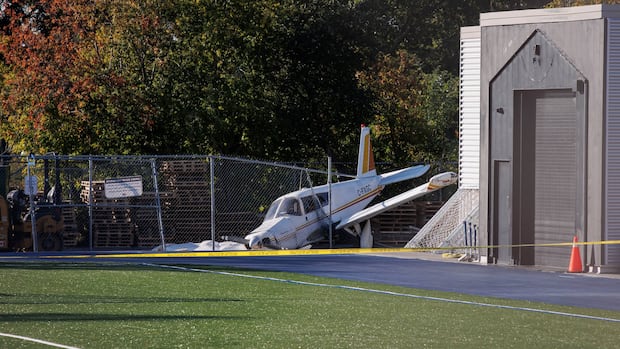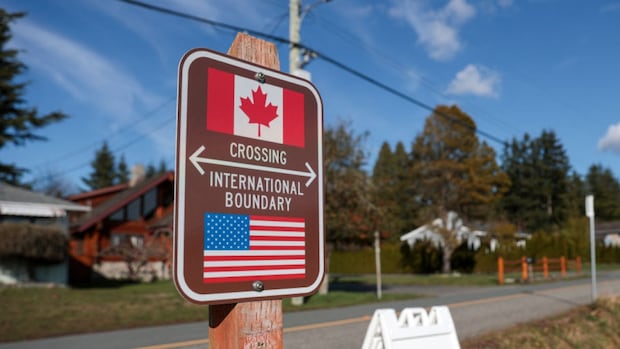[published_date]
Harrowing air traffic control audio reviewed by CBC News reveals the tense moments before a small plane crash-landed near a Toronto high school Monday night.
The recording shows interactions began as normal, with someone on the plane requesting permission to land at Billy Bishop airport.
But just moments later, that person makes an urgent call to the air traffic control operator.
“City centre, I think I might have an engine failure,” they said in a recording that was uploaded to LiveATC.net, a website that shares air traffic control audio.
When asked if the plane can make it to the airport, the person on the plane responds: “Negative.”
A short time later, they can be heard on the radio telling the air traffic control operator there is nowhere to land.
“Can you find a highway or a street that’s not very busy or a park or something?” the air traffic controller responds.
Moments later the person on the plane — sounding more distressed — announces the aircraft is landing in a soccer field, but that there are people around. That’s the final time anyone on the plane is heard over the radio.
From there, air traffic control and emergency responders can be heard discussing where to look for the plane in its last known location around Bloor Street and about two kilometres from the Don Valley Parkway.
Officials say no one was injured after a small plane crashed near a high school in Toronto’s east end on Monday night. CBC’s Clara Pasieka has the latest details — and reaction.
The plane departed from Orillia and experienced engine failure while on the way to Billy Bishop airport, said the Transportation Safety Board of Canada, which is investigating the incident, in a statement.
The pilot and two passengers walked away uninjured after the aircraft crashed outside Monarch Park Collegiate Institute in Toronto’s east end, said Toronto Fire Chief Jim Jessop on Monday.
He said no one in the nearby park and soccer field was injured.
Classes will continue as normal at Monarch Park on Tuesday, but a section of the parking lot will be closed off, said Ryan Bird with the Toronto District School Board.

Pilots are tested before aircraft access: plane rental company
The plane, a four-passenger Piper Cherokee, conducted a “forced approach,” also known as a sudden landing, at an unintended location due to mechanical, human or atmospheric issues, said Flight Club CEO Mathew Fernandez in a statement.
A plane with the same registration as the one that crashed on Monday is listed for rent on the website for Flight Club, a company that rents privately-owned planes to pilots.
Fernandez says the pilot is in charge of conducting safety inspections before a flight, including doing a walk around the plane, checking the engine, and making sure there is sufficient fuel and oil for the trip.
He says owners are in charge of maintaining the plane and engine, while day to day checks fall to the pilot.
“Engine failures unfortunately do happen,” he said. “The difference is that on big airplanes there’s usually more than one and so they’re able to conduct landing generally at an airport without too much commotion.”
In the case of an engine failure in a single-engine aircraft, pilots have no choice but to bring the plane down right away, he said.

Per company policy, pilots must complete a test with a certified flight instructor before gaining access to an aircraft, he said.
He says tests check if pilots can assess safety conditions and their performance of “critical flight manoeuvres,” such as a forced approach with a simulated engine failure.
“Aircraft owners are very selective about sharing their aircraft and want to [be absolutely] certain that only qualified and competent pilots access their aircraft,” Fernandez said.
Pilots operating the Piper Cherokee must have a private pilot license, which requires a pilot to have a minimum of 50 hours of in-aircraft experience, “many more hours” of ground school and ground briefing, and passing various situational tests, said Fernandez.
Fernandez said his company’s co-founder informed the plane’s owner of the crash, who was “grateful” to be quickly made aware of the situation.




